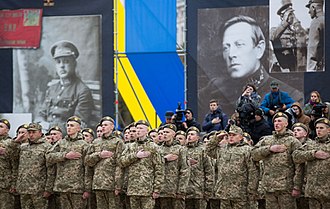English2017 Английский для всех простым языком О Дне защитника Отечества — топик на английском с переводом Defender of the Fatherland day It is a day off
History[edit]
First celebrated in 1919, the holiday marks the date in 1918 during the Russian Civil War when the first mass draft into the Red Army occurred in Petrograd and Moscow (on 17 February).[1] In January 1919, it was decided to combine the celebration of that day with the anniversary of the publication of the decree on the establishment of the Red Army (of 18 February 1918).[1] In 1919, 17 February fell on a Monday, so it was decided to move the holiday to the nearest Sunday – 23 February.[1] That choice of day has been retained ever since.[1] It was originally known as «Red Army Day» (Russian: День Красной Армии).[1] In 1923, it was officially named Day of the Red Army and the Navy.[1]
In 1949, it was renamed to Soviet Army and Navy Day (Russian: День Советской армии и Военно-морского флота, romanized: Dyen’ Sovyetskoy armii i Voyenno-morskogo flota).[1] Following the fall of the Soviet Union in 1991, the holiday was given its current name in 2002 by Russian President Vladimir Putin, who decreed it a state holiday (in Russia).[2]
О Дне защитника Отечества — топик на английском с переводом
Defender of the Fatherland day
It is a day off for the general population, and schools, banks and official buildingsand most businesses are closed.
Many Russians observe February 23 as men’s day because military service is obligatory for most men in Russia.
Women often give presents and postcards to their male relatives, including those who never served in the military. On a workday before or after the holiday, many women also congratulate their male colleagues and schoolboys receive small presents from their female classmates.
Russian authorities organize local parades to honor the military and veterans on this day.
Founded in 1919 to mark the establishment of the Soviet Red Army, the name was changed to Red Army Day in 1923. After the Second World War, the name changed again in 1946 to Day of the Soviet Army and Navy. After the collapse of the Soviet Union, the official holiday was renamed the Defender of the Fatherland Day.
Common symbols of Defender of the Fatherland Day are a soldier and the Russian flag. These symbols often appear on postcards and congratulatory banners in Russian cities on this day.
День защитника Отечества
Перевод
Это выходной день для большинства населения, а школы, банки и государственные здания закрыты.
Многие россияне отмечают 23 февраля как мужской день, потому что военная служба обязательна для большинства мужчин в России.
Женщины часто дарят подарки и открытки родственникам-мужчинам, в том числе тем, кто никогда не служил в армии. В рабочий день до или после праздника многие женщины также поздравляют своих коллег-мужчин, а школьники получают небольшие подарки от своих одноклассниц.
В этот день российские власти организовывают в честь военных и ветеранов местные парады.
Основанная в 1919 году в ознаменование создания Советской Красной Армии, название было изменено на День Красной Армии в 1923 году. После Второй мировой войны название снова изменилось в 1946 году на День Советской Армии и Военно-морского флота. После распада Советского Союза официальный праздник был переименован в День защитника Отечества.
Общими символами Дня защитника Отечества являются солдат и российский флаг. Эти символы часто появляются на открытках и поздравительных баннерах в российских городах в этот день.
Источник
Celebrations in Russia and worldwide[edit]

Officially, as the name suggests, the holiday celebrates people who are serving or were serving the Russian Armed Forces (both men and women, both military and civilian personnel), but unofficially, nationally it has also come to include the celebration of men as a whole, and to act as a counterpart of International Women’s Day on March 8.
The holiday is celebrated with parades and processions in honor of veterans, and women also give small gifts to men in their lives, especially husbands (or boyfriends, fiances), fathers, sons and brothers. As a part of the workplace culture, women often give small gifts to their male co-workers. Consequently, in colloquial usage, the holiday is often referred to as «Men’s Day» (Russian: День мужчин, romanized: Den’ muzhchin).
One of the holiday traditions in Moscow is a ceremony near the Kremlin, the laying of wreaths at the Tomb of the Unknown Soldier. The Russian President, the heads of both chambers of parliament, military leaders, representatives of other branches of government, heads of political parties as well as Russian Orthodox Church officials[3] arrive at the Alexander Garden which is located near the Moscow Kremlin walls. After a moment of silence, the national anthem is played and a solemn march of an honour guard unit passes. In the evening, the country’s leadership is present at a concert dedicated to the holiday on the State Kremlin Palace. Also in the evening in Moscow and in many other cities of Russia, fireworks are displayed. A military parade on Omsk’s Cathedral Square is held on 23 February.[4]
In other countries[edit]
In Belarus[edit]
In Belarus, the holiday (known as Дзень абаронцы Айчыны in the Belarusian language) celebrates the date of 23 February 1918, the date of the formation of the armed forces of modern day Belarus. It was made an official holiday by President Alexander Lukashenko on 25 March 2004. Traditionally, on 23 February, the President of Belarus lays a wreath at the monument on Victory Square in Minsk. Being that they both celebrate the holiday, soldiers of the Armed Forces of Belarus and Russian Armed Forces soldiers also hold joint festive events on 23 February.
In Israel[edit]
In Israel, a version of the holiday exists as Yom HaZikaron, a national remembrance day observed in Israel held in 4 Iyar in the Hebrew calendar for all Israeli military personnel in the Israel Defense Forces who lost their lives in the struggle that led to the establishment of the State of Israel and for those who have been killed subsequently while on active duty in Israel’s armed forces. This holiday is observed by a number of Jews who have emigrated from Russia and various post-Soviet states.
In Kazakhstan[edit]

A T-72 tank during a Defender of the Fatherland Day parade in
Astana
, Kazakhstan, in 2015.
In Kazakhstan, Defender of the Fatherland Day is celebrated on 7 May.[5] The Kazakh Armed Forces was established on this date 1992 and was only made national holiday in October 2012. The holiday often coincides with the Victory Day celebrations on May 9.
In Kyrgyzstan[edit]

A Defender of the Fatherland Day parade in
Bishkek
, Kyrgyzstan, 2018.
In Kyrgyzstan, Defender of the Fatherland Day is a non-working holiday. In Bishkek, there is a military parade of the Bishkek Garrison.[6][7] The holiday was first introduced in the country by the Government of Kyrgyzstan on January 20, 2003.[8] Personnel of the Kyrgyz Army have their own professional holiday on May 29, which is the Day of the Armed Forces of Kyrgyzstan.
In South Ossetia[edit]
February 23 is an official holiday in the partially recognized Republic of South Ossetia. The country’s leadership pay to veterans who served in the Soviet Army as well as all those who served in the Armed Forces of South Ossetia and died in the 1991–1992 South Ossetia War and the Russo-Georgian War. The holiday also coincide with festive events that surround the creation of the Ministry of Defense of the republic.[citation needed]
In Tajikistan[edit]

Armed Forces Day in Dushanbe, Tajikistan, 2013.
In Tajikistan, the holiday is known as «Tajik National Army Day» (Tajik: Рӯзи Артиши Миллӣ Тоҷик), celebrating the Tajik National Army. However, it has been known that other military units, such as the Tajik Air Force, have taken part in the celebration.[9]
In Transnistria[edit]
In Transnistria, Defender of the Fatherland Day is a public holiday. The main celebrations are held in Tiraspol. They are attended by the President of the republic and the heads of defence/law enforcement agencies.[10] By decree of President Igor Smirnov on 13 June 2001, it was included in the list of professional holidays and is a non-working holiday.[11]
In Turkmenistan[edit]
Defender of the Fatherland Day (Turkmen: Watan gününiň goragçysy) in Turkmenistan is celebrated on 27 January, celebrating the anniversary of the founding of the Armed Forces of Turkmenistan. It was previously celebrated as Army Day until President Gurbanguly Berdimuhamedow changed its name in 2009.[12] The Ministry of Defense organizes festive concerts and activities in military units on this day. The current military doctrine was adopted on the eve of the holiday in 2016.[13]
In Ukraine[edit]

Soldiers taking the oath of allegiance in Kyiv, Ukraine, October 2017.
In Ukraine, Defender of the Fatherland Day (Ukrainian: День захисника Вітчизни/ Den’ zakhysnyka Vitchyzny) was never celebrated as a state holiday.[14] In 1999 President Leonid Kuchma recognized 23 February as Defenders of the Fatherland Day without, however, granting it any official status.[14][15] President Petro Poroshenko made a statement on 24 August 2014, according to which, Ukraine «should not celebrate the holidays of the military-historical calendar of Russia, but will honor the defenders of our homeland, not someone else’s».[16] On 14 October 2014, a decree by Poroshenko instated the Defender of Ukraine Day, with its official holiday status.[17][18]
Today, even though it is not a public holiday, many women will still give some extra attention to male relatives, friends, husbands and boyfriends, especially to those serving in the Armed Forces of Ukraine.[19][20] Armed Forces Day for the entire Armed Forces is celebrated yearly on 6 December with special programs and nationwide gun salutes and fireworks displays.[20]
The Donetsk People’s Republic and Luhansk People’s Republic continue to celebrate Defender of the Fatherland Day.[citation needed]
Сочинение на английском языке 23 февраля/ February 23 с переводом на русский язык
На английском языке. February 23Every year at the end of winter Russian people and several other neighboring nations celebrate the Defender of the Fatherland Day. This holiday falls on February 23rd and has special meaning. It was first celebrated in the first half of the 20th century as the day of Red Army. Today, it’s commonly known as the father’s or all men’s day. On this occasion women across Russia and some former Soviet republics prepare small but hearty presents for their fathers, husbands, sons, brothers, boyfriends and simply male friends. Apart from presents they can buy postcards or flowers for them. It is especially appreciated when little girls prepare some handmade stuff for their fathers or brothers. Such small but valuable presents are always cherished. The Defender of the Fatherland Day is observed countrywide. You can see the public concerts, parades, festivals and other topical performances nearly in every large and small city. Children and adults participate in such events to keep their fathers happy and to set a festive mood. The military and veterans are especially honored on this day. As well as the 8th of March, February 23rd is the public holiday in Russia. Offices and schools don’t work, so it’s normal to congratulate male colleagues and classmates a day before or after the actual holiday. Most companies collect a certain amount of money to buy some presents for male employees. Female workers sometimes set a festive table with wine and snacks for their colleagues and together they celebrate the event. Although February 23rd originated as the day of people who serve or used to serve in the army, today even little boys receive presents and congratulations. In the course of time the holiday became better known as Men’s Day.
Перевод на русский язык. 23 февраля
Ежегодно в конце зимы русский народ и некоторые другие соседние народы празднуют День защитника Отечества. Этот праздник выпадает на 23 февраля и имеет особое значение. Он впервые отмечался в первой половине 20-го века, как день Красной Армии. Сегодня он широко известен как день отцов или всех мужчин. По этому случаю, женщины всей России и некоторых бывших советских республик готовят небольшие, но душевные подарки для своих отцов, мужей, сыновей, братьев, парней и просто друзей мужского пола. Помимо подарков, они могут купить для них открытки или цветы. Особенно ценится, когда маленькие девочки создают какие-нибудь безделицы своими руками для отцов или братьев. Такими небольшими, но ценными подарками всегда дорожат. День защитника Отечества отмечается по всей стране. Почти в каждом большом и маленьком городе можно увидеть публичные концерты, парады, фестивали и другие тематические выступления. В подобных мероприятиях участвуют и дети, и взрослые, для того чтобы видеть своих отцов счастливыми и создать праздничное настроение. Военным и ветеранам в этот день особый почет. Так же как и 8 марта, 23 февраля является государственным праздником в России. Офисы и школы не работают, так что приемлемо поздравлять коллег-мужчин и одноклассников за день до или после фактического праздника. Большинство компаний собирают определенную сумму на покупку подарков для работников мужского пола. Работницы иногда накрывают праздничный стол с вином и закусками для своих коллег, и вместе они празднуют это событие. Несмотря на то, что 23 февраля возникло как день тех, кто служит или служил в прошлом, сегодня даже маленькие мальчики получают подарки и поздравления. С течением времени этот праздник стал более известен как Мужской день.
Источник
See also[edit]
- Police and Internal Affairs Servicemen’s Day
- Border Guards Day
- Navy Day
- Day of the Armed Forces of Azerbaijan
- Defender of the Motherland Day
- Army Day (Armenia)
References[edit]
- ^ a b c d e f g (in Ukrainian) Таємниця 23 лютого. Українцям є що святкувати «‘Mystery of February 23. Ukrainians have something to celebrate», Ukrayinska Pravda (23 February 2013)
- ^ Russian Nationalism and the National Reassertion of Russia by Marlène Laruelle, Taylor & Francis, 2009, ISBN 0415484464 (page 245)
- ^ В День защитника Отечества Святейший Патриарх Кирилл возложил венок к могиле Неизвестного солдата у Кремлевской стены
- ^ https://ngs55.ru/news/more/68981914/
- ^ «Archived copy». Archived from the original on 2018-01-20. Retrieved 2018-06-20.CS1 maint: archived copy as title (link)
- ^ Военный парад прошел в Киргизии в День защитника Отечества. РИА Новости (in Russian). 2012-02-23. Retrieved 2017-09-04.
- ^ Тимофеенко, Анна (2012-02-23). В Бишкеке прошли показательные выступления Бишкекского гарнизона и духового оркестра Минобороны. K-News (in Russian). Retrieved 2017-12-20.
- ^ http://kg.akipress.org/news:631091
- ^ John Pike. «Tajikistan- Air Force». globalsecurity.org.
- ^ Военно-спортивный праздник, посвящённый Дню защитника Отечества — 23/02/18
- ^ https://mopmr.org/2020/02/23/23-%D1%84%D0%B5%D0%B2%D1%80%D0%B0%D0%BB%D1%8F-%D0%B4%D0%B5%D0%BD%D1%8C-%D0%B7%D0%B0%D1%89%D0%B8%D1%82%D0%BD%D0%B8%D0%BA%D0%B0-%D0%BE%D1%82%D0%B5%D1%87%D0%B5%D1%81%D1%82%D0%B2%D0%B0-2/
- ^ http://www.turkmenistan.ru/en/node/7774
- ^ https://sng.today/ashkhabad/5867-turkmenistan-prazdnuet-den-zaschitnika-otechestva.html
- ^ a b Uncertain Defenders of the Motherland Day Archived 2017-08-31 at the Wayback Machine, Kyiv Weekly (27 February 2012)
- ^ Law regarding Defender of the Fatherland Day Archived 2009-02-25 at the Wayback Machine Legislation of Ukraine
- ^ (in Ukrainian) Poroshenko: Ukraine will never celebrate February 23 Archived 2014-08-25 at the Wayback Machine, TVi (24 August 2014)
English-language translation of Poroshenko’s Independence Day remarks in Kyiv, Kyiv Post (24 August 2014) - ^ Ukraine’s Defenders Day to be observed on October 14, February 23 celebration canceled, Interfax-Ukraine (14 October 2014)
- ^ President proclaimed October 14 the Day of Defender of Ukraine, president.gov.ua (14 October 2014)
- ^ Ukrainian Holidays, Optima Tours
Feminists Contest Politics and Philosophy (Philosophy and Politics), Peter Lang, 2005, ISBN 978-90-5201-252-0 (page 197) - ^ a b Culture Smart! Ukraine by Anna Shevchenko, Kuperard, 2006, ISBN 978-1-85733-327-5




